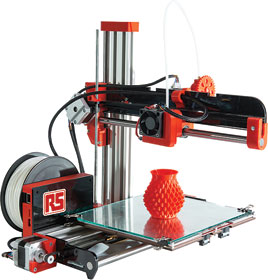

The electronics industry becomes more and more fascinating every day. New products are launched daily. A real game changer, however, is hard to come by.
Things evolve and change very quickly although many a new product is only a smaller version of the previous one, or perhaps comes with a new feature that makes life a bit easier. All of which is great and necessary, and helps the world to continue to evolve, allowing the electronics industry to continue to remain one of the most interesting, exciting and important industries of them all. That ‘something’ though, that’s available and accessible, and has that special quality with the ability to really change things, is hard to come by these days as we live in such a technologically advanced world.
RS Components believes its recently announced distribution agreement with RepRapPro may be the next game changer, promising to deliver affordable, open source, self replicating 3D printing technology to engineers. Some even suggest that this technology may enable a new revolution, forming the basis for ‘the era of manufacturing’.
3D printing is the process of making a solid object from a digital model. The technology has been around for 30 plus years but only really became attainable from a commercial point of view a few years ago as the innovation of this technology has improved and evolved and became more accessible to engineers and smaller manufacturers.
3D printing is used more and more in all sorts of industries like food, military, electronics, automotive; it can be used to make toys and jewellery and is also used in the medical field, to name but a few. The opportunities and possibilities are highly compelling as innovation in this area continues to accelerate at a rapid rate.
As with any disruptive technology, however, teething problems have inevitably been encountered. Within the medical industry, for example, its potential to save or improve lives has stirred up ethical debate concerning the extent to which man-made technology should be integrated into the human body.
So-called ‘bio printing’ is the technology that has been cause for some doubt, but has also become a very popular topic as most are very excited about this technology which allows human tissue to be created through 3D printers. Soft tissue organs such as an ear or kidney can be produced, and other body parts allowing hip, skull and jaw transplants have already been manufactured.
Generally speaking, printed tissue is still largely used for research purposes but could soon see public application as 3D printers have already changed lives within the medical field, for example by creating a brace to provide someone who had not been able to walk for many years the opportunity to move around.
3D printing within the manufacturing industry is already a reality and is becoming more widely used. It is now at the stage where it can form a part of the internal prototyping process rather than engineers having to wait for months for their prototypes to be completed and large sums of money being dedicated to prototypes. This is of huge benefit within the design cycle as time and money are always critical.
Potential customers should be aware that the RepRapPro may take some time to set up when it arrives, as it comes in parts and requires self assembly. It is not a simple ‘plug & play’ process and may require some modifications and/or taking part in some online discussions where enthusiasts seek and give advice to get it working optimally. This initial setup time may even prove exciting for some as many an engineer loves a new challenge.
RepRapPro’s Ormerod 3D printer can be used in conjunction with DesignSpark mechanical 3D modelling software which was co-developed by RS and SpaceClaim, and is free to download from the DesignSpark website, another cost saver for engineers and smaller manufacturers. The printers are self replicating and hardware-only Ormerod kits, without the 3D printed parts, will soon be available for those wanting to use their printers to make more Ormerod printers.
The successful launch of the Ormerod, available first from RS, is testament to the desire for such technology as the first 500 limited edition printers sold like hot cakes. RS has made it possible for 3D printing kits to be accessible to engineers and especially the smaller manufacturers as it continues to sell the standard Ormerod printers which are as popular as the first 500 limited edition printers.
3D printing is really here. It is available, and it is accessible. It is no longer just an interesting technology or a hot (at times controversial) topic, but it is now a reality. A reality that really could be the next game changer.
For more information contact RS Components, +27 (0)11 691 9300, [email protected], www.rsonline.co.za
| Tel: | +27 11 691 9300 |
| Email: | [email protected] |
| www: | www.rs-online.co.za |
| Articles: | More information and articles about RS South Africa |

© Technews Publishing (Pty) Ltd | All Rights Reserved